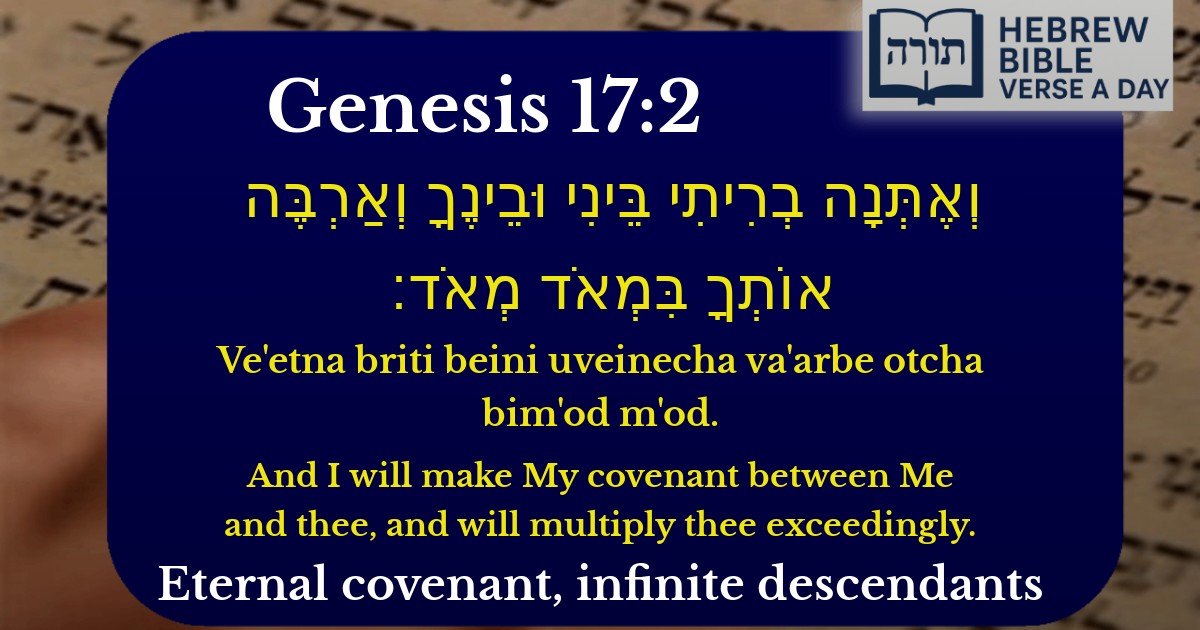Frequently Asked Questions
Q: What does the covenant in Genesis 17:2 mean?
A: In Genesis 17:2, Hashem establishes a special covenant (brit) with Avraham, promising to greatly multiply his descendants. According to Rashi, this refers not only to physical descendants but also to spiritual greatness. The covenant includes the mitzvah of circumcision (brit milah) as a sign of this eternal bond between G-d and the Jewish people.
Q: Why is this covenant with Avraham important in Judaism?
A: This covenant is foundational in Judaism because it marks the beginning of the special relationship between Hashem and the Jewish people. The Rambam explains that this brit (covenant) is eternal and forms the basis for many mitzvot. It demonstrates G-d's promise to make Avraham's descendants into a great nation, which is ultimately fulfilled through the Jewish people.
Q: How does the promise to 'multiply thee exceedingly' apply today?
A: The promise to multiply Avraham's descendants 'exceedingly' continues to be fulfilled through the Jewish people today. The Midrash teaches that this blessing refers both to numerical growth and spiritual greatness. Orthodox Jews see the survival and growth of the Jewish people throughout history, despite exile and persecution, as a direct fulfillment of this divine promise.
Q: What can we learn from G-d's promise to Avraham in this verse?
A: We learn about Hashem's faithfulness and the power of divine promises. The Talmud (Megillah 14a) discusses how this covenant demonstrates that G-d keeps His word. It also teaches us about our spiritual heritage - that just as Avraham was chosen for a special relationship with G-d, his descendants (the Jewish people) inherit this sacred connection and responsibility.
Q: What is the significance of the phrase 'between Me and thee' in this verse?
A: The phrase 'between Me and thee' emphasizes the personal nature of this covenant. As explained by the Sforno, this wasn't just a general promise, but a deeply personal agreement between G-d and Avraham. This teaches us that our relationship with Hashem is both collective (for the entire Jewish people) and individual (each person has their own connection to G-d).


The Covenant Between Hashem and Avraham
The verse (Bereishit 17:2) states: "וְאֶתְּנָה בְרִיתִי בֵּינִי וּבֵינֶךָ וְאַרְבֶּה אוֹתְךָ בִּמְאֹד מְאֹד" ("And I will make My covenant between Me and thee, and will multiply thee exceedingly"). This marks a pivotal moment in the relationship between Hashem and Avraham Avinu, establishing the brit (covenant) that would define the Jewish people.
Rashi's Explanation
Rashi explains that this covenant is specifically the brit milah (covenant of circumcision), as the subsequent verses detail. The doubling of the phrase "בִּמְאֹד מְאֹד" ("exceedingly") emphasizes the magnitude of the blessing—Avraham's descendants would multiply both physically (in numbers) and spiritually (in greatness).
Rambam's Perspective
In Hilchot Milah, Rambam (Maimonides) teaches that this covenant is eternal and foundational to Jewish identity. The promise of multiplication is not merely demographic but includes the spiritual legacy of Avraham’s teachings, ensuring his influence would endure through generations.
Midrashic Insights
Theological Significance
This verse underscores the reciprocal nature of the covenant: Hashem promises boundless growth, while Avraham and his descendants commit to upholding the mitzvah of milah and living by divine commandments. The covenant is both a privilege and a responsibility, shaping Jewish destiny.